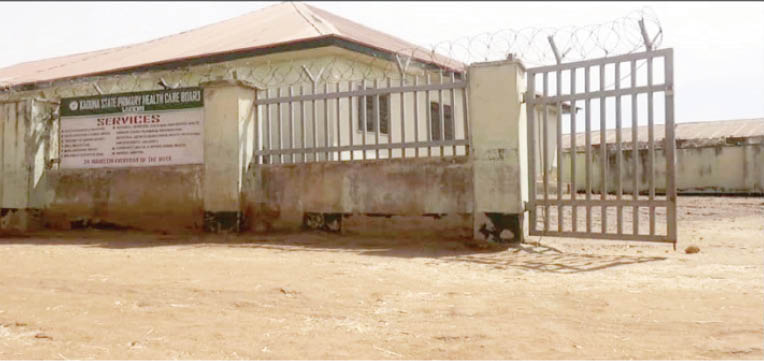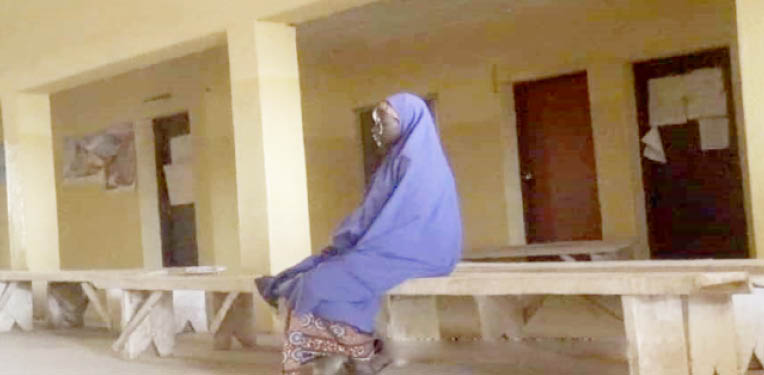How Zaria PHCs operate in unsecured environment
Primary health care is regarded as the point of call that enables health systems to support a person’s health needs – from health promotion to disease prevention, treatment, rehabilitation, palliative care and more. This strategy also ensures that health care is delivered in a way that is centred on people’s needs and respects their […]

Wucicciri PHC (outside view)
Primary health care is regarded as the point of call that enables health systems to support a person’s health needs – from health promotion to disease prevention, treatment, rehabilitation, palliative care and more.
This strategy also ensures that health care is delivered in a way that is centred on people’s needs and respects their preferences.
Primary health care is the most inclusive, equitable and cost-effective way to achieve universal health coverage.
It is also key to strengthening the resilience of health systems to prepare for, respond to and recover from shocks and crises.
The recent prevalence of insecurity in western and eastern parts of Zaria Local Government Area of Kaduna State has virtually made health care facilities inaccessible to communities and families in dire need of medical attention due to the fear of either being attacked by bandits or inability of such facilities to render effective and efficient service.
Our correspondent who visited some primary health care facilities in insecurity-prone areas of Zaria witnessed low turn out of patients, especially for pre-natal, ante-natal and routine immunization clinics, which were the most attended by rural community members.
At Kasuwan Dutse community, in the western part of Zaria, the Model Primary health care centre that receives more than 400 patients, especially on Mondays; dedicated days for Ante-natal check up had only one pregnant woman waiting to be attended to.
Hafsat Ubaidu Kugu said “I am 6 months pregnant and have been attending the clinic since I conceived. However, so many times when I come, I hardly meet any health personnel to attend to me.
“I learned that most of them based in Zaria are scared of reporting for duty due to incessant attacks by bandits either on their way to work or while here at the clinic.

“But my husband always insists that I should come every Monday and as you can see today, I’m lucky to meet two of the personnel that reported for duty,” she said.
While concurring with what Hafsat said, the Officer in charge of the centre, Ahmed Abdullahi, explained that the staff mostly reside in Zaria and could not bear the risk of travelling to distant areas to report to work.
He said the insecurity situation has continued to worsen as bandits now conduct their operations even in broad daylight.
Abdullahi noted that the PHC is located on the outskirts of the main village, thereby exposing it to great danger due to the porous nature of the locality.
He was, however, quick to appreciate the effort of the community in providing security surveillance round the facility in a bid to protect it from vandalization.
In his reaction, the village head of Kasuwar Dutse, Mallam Shehu Haruna Kugu, complained of inadequate health staff in the area and their inability to report to work punctually. He noted that sometimes, the health facility is closed for a month or more.
According to him, none of the health staff resides in the community, which makes it difficult for them to cut through the risky bushes in order to report to work.
Haruna Kugu, however, stated that the security situation has since improved positively with the formation of vigilante group who maintain surveillance and patrol the area regularly.
“Honestly, I am not happy seeing members of my community without medical care. After all, with the engagement of our vigilante group in communities around the area, the security situation has greatly improved.
“We have been convincing these health workers to endeavour to return to their duty posts, but they still can’t summon courage to come,”he said.
Comrade Gaddafi Dahiru Kugu, a member of the community and youth leader, said the only solution to the problem is for the government to recruit sons of the soil to engage in health work for effective service delivery.
“Those health workers deployed to the area no longer feel safe due to the fear of these bandits, but our youth who are used to the terrain and reside permanently in the community can unarguably deliver efficiently when giving the chance.
“And we have youths who are qualified and have various certificates on health-related disciplines that can perform the job adequately well.
“I therefore urge the government to consider engaging them, even if it’s on casual basis, so as to enhance health care provision in the community,” he appealed.
Another facility visited was the Majeru primary health care centre which was completely under lock and key with no single personnel around.
Sources said the clinic has been shut for more than two months.
Further investigation revealed that the frequent attacks and incessant kidnapping of people in the community necessitated the temporary shut down of the facility.
Shuaibu Isa Makeri, a resident of the community, said some residents of the community have also abandoned their houses and relocated to Zaria and other safer places.
He stressed that unless government takes drastic security measures around the community and entire western part of Zaria, health care provision will continue to suffer great setback.
“Where are the people to administer the health care to them, majority have fled. Therefore, health is not our primary concern for now. Our greater concern is the security of our lives and property.
“The few of us left are living in fear because the bandits usually come at will to either kill or kidnap people,” he stated.
At the Community Health Care Centre situated at the National Tuberculosis and Leprosy Centre in Saye, the acting officer in charge, Veronica Philips, said both staff and patients are apprehensive whenever they come to the facility.
She recalled that some months back about nine victims, including women and children, were kidnapped by bandits from the centre.
Mrs Philips said the fear is still in them despite being located near a police station, which was the first target of attack when the bandits arrived then.
“This is why we don’t spend much time here when we open, so that everybody can disperse before evening hours.
“Bandits operates anytime they wish, and this has made the level of patronage by our patients drastically low compared to pre-insecurity days when patients from far-flung communities come to access health care in our facility,” the officer recalled.
Laying emphasis on the kind of services rendered to communities around the area by the facility, the head clinical staff, Mr Kefas Jeremiah Dishak, explained that the centre provide preventive, diagnosis and treatment services, especially to nursing mothers and children.
At the eastern part of Zaria, the situation is the same as community members no longer access health care freely and easily due to bandits attacks.
A visit to the Wucicciri Primary health care centre, about 50km east of the ancient city of Zaria, revealed that health workers similarly operate in an unsecured environment.
Sadiq Aminu Gullah, officer in charge of the PHC, explained that some of his staff reside in the locality, thereby making the job a bit easier.
He, however, added that though there were less bandits’ attacks in the community, the neighbouring villages that come to access health services from the facility are apparently unsecured.
Gullah said the clinic has lots of facility to render efficient service delivery on health-related matters, but the fear of bandits’ attacks prevents people from coming to the centre.
Mallam Dalhat Aliyu, a member of the clinic’s development committee and representative of the village head, said the community is doing well to provide adequate security to the health facility while ensuring their wives and children attend clinic during any health challenge.
Mustapha Jumare, a retired medical personnel who participates actively in health advocacy initiatives, explained that inadequate provision of effective and efficient health care services to communities devastated by insecurity has negative impact on the larger society.
“For instance, the leprosy centre situated in an unsecured environment had discharged all its in-patients who are largely lepers and tuberculosis patients.
“These are patients who need to be isolated from the community due to the infectious nature of the diseases, but they have been let loose into the society. Can you predict the consequences of such action on the larger society?
Jumare, while urging the government and the community to complement security situation by taking necessary measures towards achieving a healthy society, tasked health workers to always device means of rendering their services to save more lives.
Hajiya Khadijah Mustapha, from the Initiative for Integrated Grassroot Empowerment and Support, IIGES, advocated for more stringent measures in unsecured environment to necessitate the provision of health care to the people despite all odds.
